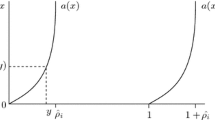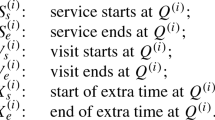Abstract
In this paper we derive decomposition results for the number of customers in polling systems under arbitrary (dynamic) polling order and service policies. Furthermore, we obtain sharper decomposition results for both the number of customers in the system and the waiting times under static polling policies. Our analysis, which is based on distributional laws, relaxes the Poisson assumption that characterizes the polling systems literature. In particular, we obtain exact decomposition results for systems with either Mixed Generalized Erlang (MGE) arrival processes, or asymptotically exact decomposition results for systems with general renewal arrival processes under heavy traffic conditions. The derived decomposition results can be used to obtain the performance analysis of specific systems. As an example, we evaluate the performance of gated Markovian polling systems operating under heavy traffic conditions. We also provide numerical evidence that our heavy traffic analysis is very accurate even for moderate traffic.
Similar content being viewed by others
References
F. Baccelli and P. Bremaud, Elements of Queueing Theory: Palm-Martingale Calculus and Stochastic Recurrences (Springer, New York, 1994).
J.E. Baker and I. Rubin, Polling with a general-service order table, IEEE Trans. Commun. 35 (1987) 283–288.
D. Bertsimas and G. Mourtzinou, A unified method to analyze overtake-free queueing systems, Adv. in Appl. Probab. 28 (1996) 588–625.
D. Bertsimas and G. Mourtzinou, Multiclass queueing systems in heavy traffic: An asymptotic approach based on distributional and conservation laws, Oper. Res. 45(3) (1997) 470–487.
D. Bertsimas and D. Nakazato, The distributional Little's law and its applications, Oper. Res. 43 (1995) 298–310.
S.C. Borst and O.J. Boxma, Polling models with and without switchover times, Oper. Res. 45 (1997) 536–543.
O.J. Boxma, Workloads and waiting times in single-server systems with multiple customer classes, Queueing Systems 5 (1989) 185–214.
O.J. Boxma and W.P. Groenendijk, Pseudo-conservation laws in cyclic-service systems, J. Appl. Probab. 24 (1987) 949–964.
O.J. Boxma and J.A. Weststrate, Waiting times in polling systems with Markovian server routing, in: Lecture Notes in Computer Science 218, eds. G. Stiege and J.S. Lie (Academic Press, Berlin, 1989) pp. 89–104.
R.B. Cooper and G. Murray, Queues served in cyclic order, Bell Syst. Tech. J. 48 (1969) 675–689.
D.R. Cox, The analysis of non-Markovian stochastic processes by the inclusion of supplementary variables, Proc. Cambridge Philos. Soc. 51 (1955) 433–441.
M. Eisenberg, Queues with periodic service and change-over times, Oper. Res. 20 (1972) 440–451.
S.W. Fuhrmann, Symmetric queues served in cyclic order, Oper. Res. Lett. 4 (1985) 139–144.
S.W Fuhrmann and R.B. Cooper, Stochastic decompositions in a M/G/1 queue with generalized vacation, Oper. Res. 33 (1985) 1117–1129.
R. Haji and G. Newell, A relation between stationary queue and waiting time distributions, J. Appl. Probab. 8 (1971) 617–620.
J. Keilson and L. Servi, A distributional form of Little's law, Oper. Res. Lett. 7 (1988) 223–227.
J. Keilson and L. Servi, The distributional form of Little's law and the Fuhrmann-Cooper decomposition, Oper. Res. Lett. 9 (1990) 239–247.
F.P. Kelly, Reversibility and Stochastic Networks (Wiley, New York, 1979).
L. Kleinrock and H. Levy, The analysis of random polling systems, Oper. Res. 36 (1988) 716–732.
A.G. Konheim and B. Meister, Waiting lines and times in a system with polling, J. Assoc. Comput. Mach. 21 (1974) 470–490.
H. Levy, Binomial-gated service: A method for effective operation and optimization of polling systems, IEEE Trans. Commun. 39 (1991) 1341–1349.
H. Levy and M. Sidi, Polling systems: Applications, modeling and optimization, IEEE Trans. Commun. 38 (1990) 1750–1760.
S.C. Srinivasan, M.M. Niu and R.B. Cooper, Relating polling systems with zero and nonzero switchover times, Queueing Systems 19 (1995) 149–168.
H. Takagi, Analysis of Polling Systems (MIT Press, Cambridge, MA, 1986).
H. Takagi, ed., Stochastic Analysis of Computer and Communication Systems (Elsevier, Amsterdam, 1990).
P. Tran-Gia, Analysis of polling systems with general input process and finite capacity, IEEE Trans. Commun. 40 (1992) 337–344.
Author information
Authors and Affiliations
Rights and permissions
About this article
Cite this article
Bertsimas, D., Mourtzinou, G. Decomposition results for general polling systems and their applications. Queueing Systems 31, 295–316 (1999). https://doi.org/10.1023/A:1019118516504
Issue Date:
DOI: https://doi.org/10.1023/A:1019118516504




